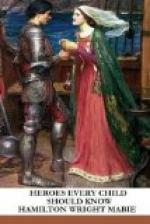About noon the Knights Hospitallers themselves, than whom, as I have said, there were no braver men in the whole army, sent word to the King that they could bear up no longer, unless they should be suffered to charge the enemy. But they got small comfort from the King. “Close up your lines,” he said to the messenger, “and be patient. Be sure that you shall not miss your reward.” A second time did they send to him, the Master of the Company himself going on the errand, but he also came back with nothing done. Now the King’s plan was this, that when the Turks should have spent their strength, and should also, through over-confidence and contempt of their adversaries, have fallen into disorder, then the trumpets should sound, and the whole army with one consent and moving all together, so that the whole of its strength should be put, as it were, into one blow, should fall upon the enemy. ’Twas a wisely conceived plan, save in this that there was needed for the full carrying out more than the King was like to find. He laid upon his soldiers a greater burden of patience than they could bear.
As for the King, he was, I can scarce doubt, glad at heart that the season of waiting was over. Certain it is that not only did he not seek to call back his men from the charge—doubtless he knew full well that to do this was beyond the power of mortal—but he himself joined in it with the greatest vehemence; none that saw him but must have believed that the affair was altogether to his liking. If others were before him at the first, but a short time had passed when he was to be seen in the front rank, aye, and before it. Where he rode, it was as if Azrael had passed, for the dead lay upon the ground on either side.
Never had the Caliph Saladin suffered so great a defeat as that which fell upon him in the battle of Arsuf; never, indeed, after that day did he dare to meet King Richard in the open field. Nevertheless, from that very day did the hope of the Christians that they should accomplish the end of their warfare grow less and less. But, if any one ask what was the cause of this falling, and who should bear the blame, I, for one, know not what answer should be made to him. There was not one in the whole army more brave and more generous in this matter than King Richard; yet even he, I hold, had not a wholly single heart. He was ever thinking of worldly things; he desired greatly to win the city of Jerusalem, yet he desired it as much for his own sake, for his own glory and renown, and the increase of his royal power, as for any other cause.
There is no need to tell of all the combats, skirmishes, and the like that took place, how on one day a company of the Templars fell into an ambush, how on another the Hospitallers suffered some damage. For the most part the Christians had the better in these things, and this not a little because of the great skill and valour of the English King. Nevertheless, the fortunes of the army seemed to go backwards rather than forwards.




